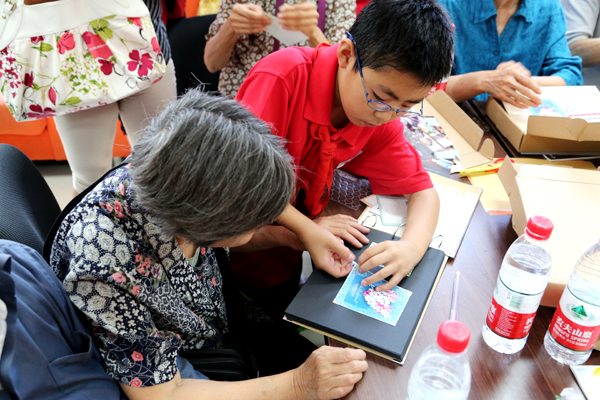
 |
|
Patients' family members participate in the regular get-togethers held by the Peking University Institute of Mental Health, to share and learn. Provided to China Daily |
Caring for someone with dementia can be very stressful for family members, especially in a country where care service is not widely available. Countless family members-turned-caregivers are finding support from each other and cyberspace.
Since her husband was diagnosed with Alzheimer's disease in 2005, Cao Guirong, a 56-year-old Beijing resident, has been participating in get-togethers of patient families and medical staff members held by the Peking University Institute of Mental Health.
"The get-togethers are very important to people like us," Cao says.
"I used to feel ashamed because of my husband's disease. But meeting people in the same predicament and getting encouragement from them makes me feel better and stronger."
Since 2000, the support group meets on the second Saturday of almost every month in the hospital, where people share their experience and receive support and advice.
Doctors are also on hand to provide treatment and care direction.
These get-togethers are not only an avenue for the caregivers to vent their frustrations, but also act as a brainstorming platform, according to Wang Huali, a dementia specialist with the hospital and initiator of the activities.
|
Related: At a loss |
Citing an example, Wang says a patient's wife was inspired to design a pair of very convenient trousers for patients, and shared the idea with the group.
But, such a support group is only available in Beijing. For others, the Internet serves as an alternative.
There are hundreds of online forums and instant-message groups for families with dementia patients, and micro-blogging groups are also available now. These social media serve the same purpose as the support group in the hospital, where people share their experience, seek advice and encourage each other.
Zi Nuo, 52, a resident in Zhuhai, Guangdong province, says she receives support from the micro-blogging groups. Her mother suffers from severe dementia and feels scared or lost in an unfamiliar environment.
Zi used to feel lonely as she is confined to her apartment with her mother. But through a micro-blogging group, she has made a lot of friends and they help and encourage each other.
"The Internet keeps me connected with the outside world. I feel less lonely now," Zi says.
Once a young woman in Tianjin sought advice in the micro-blogging group on the type of dementia-related publications to read.
Zi found a useful book and sent it to Tianjin.
"Only caregivers know what it is really like to live with a dementia patient, and can truly understand each other," Zi says.
Although there is bitterness in caring for a patient, happiness exists, and many of them share happy moments through the Internet, Zi adds.
But emotional support is not enough when faced with real problems.
Many micro-bloggers complain that because of the poor infrastructure, they cannot take patients out for shopping, dinner or traveling, and there are no back-up caregivers, even if they are willing to pay.
"These dementia patients used to contribute to society when they were young and able," says netizen Huoluo Bantou, who takes care of his affected wife in Xi'an, Shaanxi province.
"We hope there will be some help and special service from the community and government."
He says it will be great if society provides emergency home care service or organizes groups for dementia families to share experience and care skills, and medicines are easily available at nearby hospitals.

Muslims greet annual festival of Eid al-Adha in Yinchuan |

Cute boxed meals |

Cafe Noir hosts Singapore food festival |

Old style 'bing sut' |

World Food Day |

Muslims greet Eid al-Adha in Yinchuan |

Indonesian students celebrate World School Milk Day |

Cute boxed meals |

Disney's new heights |

My Son's secrets |

Buy, buy in Bangkok |

A thousand trades, a thousand tales |